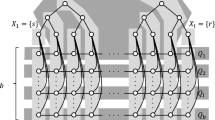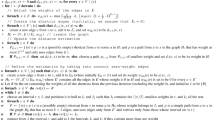Abstract
Distributed optimization algorithms are frequently faced with solving sub-problems on disjoint connected parts of a network. Unfortunately, the diameter of these parts can be significantly larger than the diameter of the underlying network, leading to slow running times. This phenomenon can be seen as the broad underlying reason for the pervasive \(\tilde{\Omega }(\sqrt{n} + D)\) lower bounds that apply to most optimization problems in the CONGEST model. On the positive side, [Ghaffari and Hauepler; SODA’16] introduced low-congestion shortcuts as an elegant solution to circumvent this problem in certain topologies of interest. Particularly, they showed that there exist good shortcuts for any planar network and more generally any bounded genus network. This directly leads to fast \(O(D \log ^{O(1)} n)\) distributed algorithms for MST and Min-Cut approximation, given that one can efficiently construct these shortcuts in a distributed manner. Unfortunately, the shortcut construction of [Ghaffari and Hauepler; SODA’16] relies heavily on having access to a genus embedding of the network. Computing such an embedding distributedly, however, is a hard problem—even for planar networks. No distributed embedding algorithm for bounded genus graphs is in sight. In this work, we side-step this problem by defining tree-restricted shortcuts: a more structured and restricted form of shortcuts. We give a novel construction algorithm which efficiently finds such shortcuts that are, up to a logarithmic factor, as good as the best restricted shortcuts that exist for a given network. This new construction algorithm directly leads to an \(O(D \log ^{O(1)} n)\)-round algorithm for solving optimization problems like MST for any topology for which good restricted shortcuts exist—without the need to compute any embedding. This greatly simplifies the existing planar algorithms and includes the first efficient algorithm for bounded genus graphs.

Similar content being viewed by others
Notes
The algorithm can be easily modified to run in \(O(\sqrt{n}\log ^* n + D)\) rounds of communication by growing components to size \(\sqrt{n / \log ^* n}\) in the first phase of the algorithm.
Throughout this paper, \(\widetilde{O}(\cdot )\), \(\widetilde{\Theta }(\cdot )\) and \(\widetilde{\Omega }(\cdot )\) hide polylogarithmic factors in n, the number of nodes in the network.
References
Das Sarma, A., Holzer, S., Kor, L., Korman, A., Nanongkai, D., Pandurangan, G., Peleg, D., Wattenhofer, R.: Distributed verification and hardness of distributed approximation. In: Proceedings of the Symposium on Theory of Computing (STOC), pp. 363–372 (2011)
Elkin, M.: Unconditional lower bounds on the time-approximation tradeoffs for the distributed minimum spanning tree problem. In: Proceedings of the Symposium on Theory of Computing (STOC), pp. 331–340 (2004)
Elkin, M.: An unconditional lower bound on the time-approximation trade-off for the distributed minimum spanning tree problem. SIAM J. Comput. 36(2), 433–456 (2006)
Frischknecht, Silvio., Holzer, Stephan., Wattenhofer, Roger.: Networks cannot compute their diameter in sublinear time. In: Proceedings of ACM-SIAM Symposium on Discrete Algorithms (SODA), pp. 1150–1162 (2012)
Ghaffari, M., Haeupler, B.: Distributed algorithms for planar networks I: Planar embedding. Manuscript, (2015)
Ghaffari, M., Haeupler, B.: Distributed algorithms for planar networks II: Low-congestion shortcuts, mst, and min-cut. In: Proceedings of ACM-SIAM Symposium on Discrete Algorithm (SODA), pp. 202–219. SIAM, (2016)
Ghaffari, M., Kuhn, F.: Distributed minimum cut approximation. In: Proceedings of the International Symposium on Distributed Computing (DISC), pp. 1–15 (2013)
Ghaffari, M., Karrenbauer, A., Kuhn, F., Lenzen, C., Patt-Shamir, B.: Near-optimal distributed maximum flow: Extended abstract. In: The Proceedings of the International Symposim on Principles of Distributed Computing (PODC), pp. 81–90 (2015)
Garay, J.A., Kutten, S.., Peleg, D.: A sub-linear time distributed algorithm for minimum-weight spanning trees. In: Proceedings of the Symposium on Foundations of Computer Science (FOCS), (1993)
Ghaffari, M., Li, J.: New distributed algorithms in almost mixing time via transformations from parallel algorithms. arXiv preprint arXiv:1805.04764, (2018)
Haeupler, B., Hershkowitz, D Ellis., Wajc, D.: Round-and message-optimal distributed graph algorithms. In: Proceedings of the 2018 ACM Symposium on Principles of Distributed Computing, pp. 119–128. ACM (2018)
Haeupler, B., Izumi, T., Zuzic, G.: Low-congestion shortcuts without embedding. In: Proceedings of the 2016 ACM Symposium on Principles of Distributed Computing, pp. 451–460. ACM (2016)
Haeupler, B., Izumi, T., Zuzic, G.: Near-optimal low-congestion shortcuts on bounded parameter graphs. In: International Symposium on Distributed Computing, pp. 158–172. Springer (2016)
Haeupler, B., Li, J.: Faster distributed shortest path approximations via shortcuts. arXiv preprint arXiv:1802.03671 (2018)
Haeupler,B., Li, J., Zuzic, G.: Minor excluded network families admit fast distributed algorithms. In: Proceedings of the 2018 ACM Symposium on Principles of Distributed Computing, pp. 465–474. ACM (2018)
Holzer, S., Wattenhofer, R.: Optimal distributed all pairs shortest paths and applications. In: The Proceedings of the International Symposium on Principles of Distributed Computing (PODC), pp. 355–364 (2012)
Izumi, T., Wattenhofer, R.: Time lower bounds for distributed distance oracles. In: Proceedings of the International Conference on Principles of Distributed Systems, pp. 60–75 (2014)
Kutten, S., Peleg, D.: Fast distributed construction of k-dominating sets and applications. In: Proceedings of the International Symposium on Principles of Distributed Computing (PODC), pp 238–251 (1995)
Khan, M., Pandurangan, G.: A fast distributed approximation algorithm for minimum spanning trees. Distrib. Comput. 20(6), 391–402 (2008)
Frank Thomson, L., Bruce M, M., Satish B, R.: Packet routing and job-shop scheduling in O(congestion+ dilation) steps. Combinatorica 14(2), 167–186 (1994)
Lenzen, C., Patt-Shamir, B., Peleg, D.: Distributed distance computation and routing with small messages. Distrib. Comput. 32(2), 133–157 (2019)
Nnongkai, D.: Distributed approximation algorithms for weighted shortest paths. In: Proceedings of the Symposium on Theory of Computing (STOC), pp. 565–573 (2014)
Nešetřil, J., Milková, E., Nešetřilová, H.: Otakar boruvka on minimum spanning tree problem translation of both the 1926 papers, comments, history. Discrete Math. 233(1), 3–36 (2001)
Nanongkai, D., Su, H.-H.: Almost-tight distributed minimum cut algorithms. In: Proceedings of the International Symposium on Distributed Computing (DISC), pp 439–453 (2014)
Peleg, D.: Distributed Computing: A Locality-sensitive Approach. Society for Industrial and Applied Mathematics, Philadelphia (2000)
Peleg, D., Rubinovich, V.: A near-tight lower bound on the time complexity of distributed MST construction. In: Proceedings of the Symposium on Foundation of Computer Science (FOCS), p 253 (1999)
Author information
Authors and Affiliations
Corresponding author
Additional information
Publisher's Note
Springer Nature remains neutral with regard to jurisdictional claims in published maps and institutional affiliations.
This work was supported in part by KAKENHI No. 15H00852 and 16H02878 as well as NSF grants CCF-1527110, CCF-1618280, CCF-1814603, CCF-1910588, NSF CAREER award CCF-1750808, a Sloan Research Fellowship and the 2018 DFINITY fellowship.
Rights and permissions
About this article
Cite this article
Haeupler, B., Izumi, T. & Zuzic, G. Low-Congestion shortcuts without embedding. Distrib. Comput. 34, 79–90 (2021). https://doi.org/10.1007/s00446-020-00383-2
Received:
Accepted:
Published:
Issue Date:
DOI: https://doi.org/10.1007/s00446-020-00383-2




